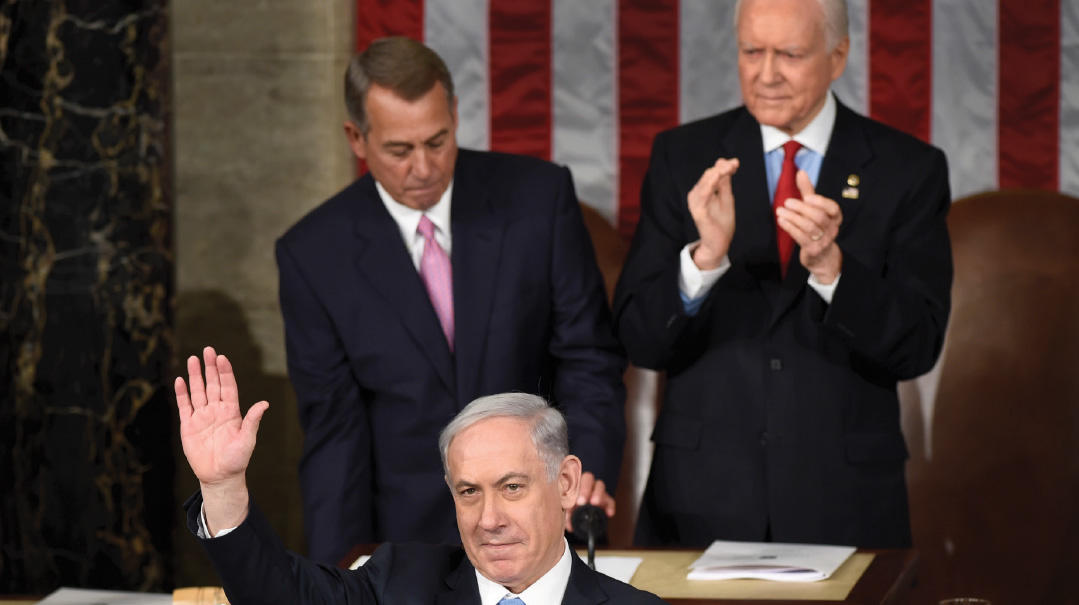Is New York Seeing Red?

Shaken by a crime wave, the Empire State’s voters may be poised to hand Republican Lee Zeldin the keys to the Executive Mansion
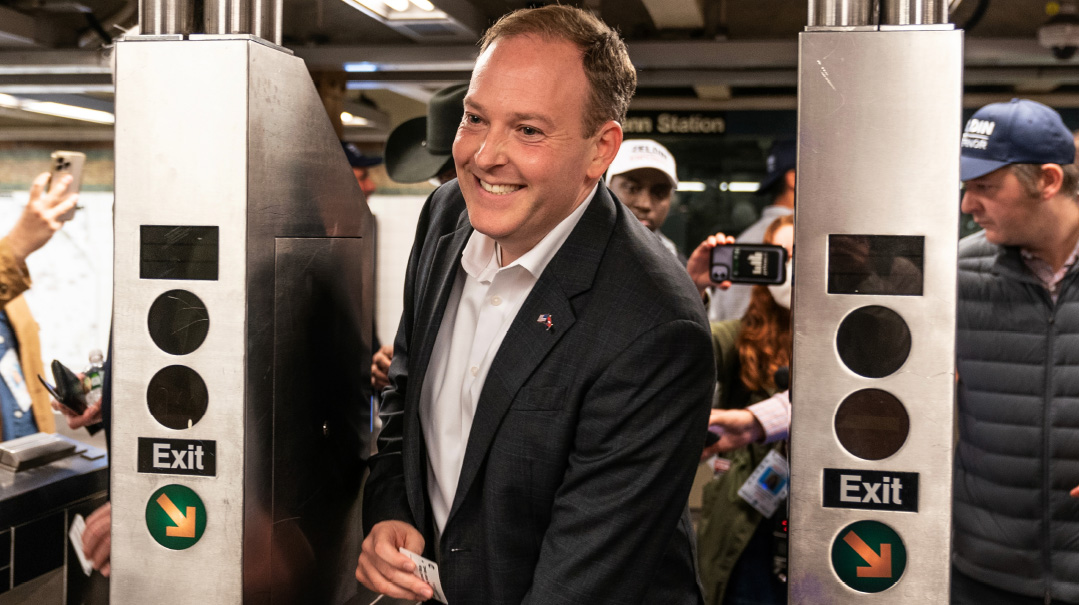
Photos: Elchanan Kotler
AS the 2022 New York gubernatorial race enters its final week, we’re in a very different place than when we started out. When Republican congressman Lee Zeldin declared his candidacy in April 2021, no one gave him much of a chance against the Democratic incumbent — Andrew Cuomo. Kathy Hochul replaced him in August of last year, but still held a huge lead over Zeldin for most of the campaign.
She has seen Zeldin whittle that lead down to a razor’s edge, and most analysts say it’s because crime has crept to the top of the list of New York voter concerns.
We’ve been told for decades that the law-and-order coalition that put Republicans George Pataki and Rudy Giuliani in power in the 1990s has long since dissipated.
George Floyd, apparently, has brought it back together. The race riots that engulfed the nation in 2020 have died down, but haven’t really completely ended. The crime rates that began soaring over the course of that summer have only continued going up — and up and up. And that has gradually bubbled to the surface as the biggest issue in the New York governor’s race, eclipsing even the flailing economy and rising inflation in importance.
That anxiety is causing many voters to give the Republican candidate a serious chance at leading New York, the bluest of blue states, in next Tuesday’s election. And it’s making national headlines.
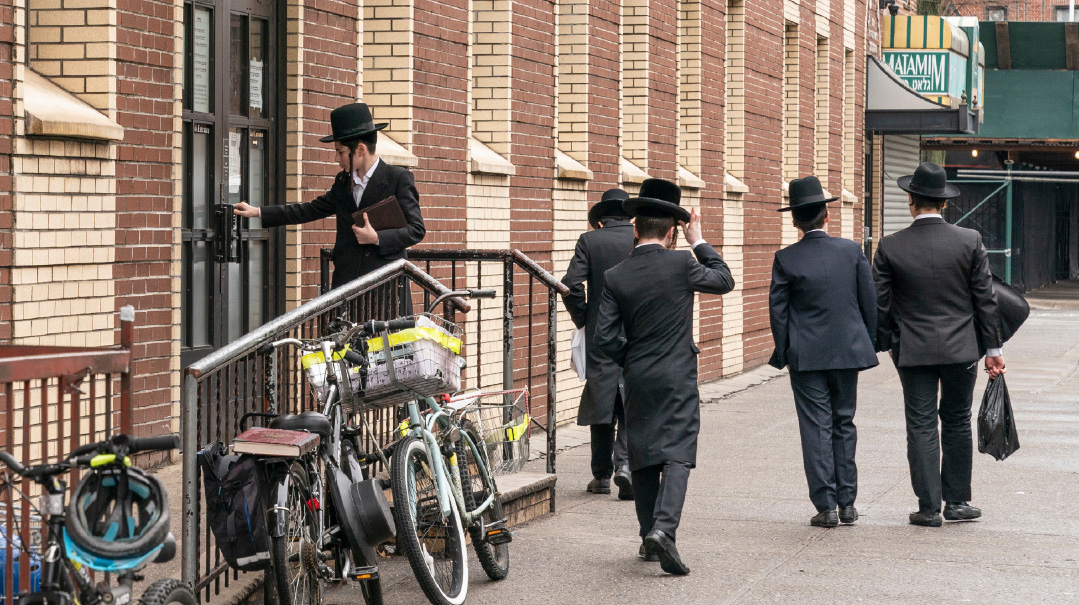
Talking Past Each Other
Kathy Hochul and Lee Zeldin seem to be campaigning in two separate worlds. Hochul has done few actual events in person, preferring instead to reach voters through her Twitter feed and ad spending. Her stump speeches to Democratic donors are filled with dark denunciations of Zeldin as a threat to democracy a threat to women.
“Reminder: Lee Zeldin voted against certifying the 2020 election, spread the Big Lie, and opposed a commission to investigate the January 6 attack,” Hochul tweeted this month. “As even worse details emerge about that day, he continues to put his loyalty to Trump over New York. He’s a threat to our democracy.”
Zeldin, on the other hand, has been pounding the pavement, holding press conferences at subway stops to draw attention to rising crime rates.
He has amplified his campaign message by releasing daily videos showing senseless violence perpetrated against people minding their own business. A man waiting at a Bushwick subway platform last week was pushed onto the tracks before an oncoming train (he survived); a teenage girl was stabbed at a Washington Heights train depot the next day; and a man riding a Citi Bike in Bay Ridge was randomly attacked by two men.
The New York Post has kept a running front-page count of criminals who have been arrested and released within hours. Zeldin has blamed the leniency of progressive Manhattan district attorney Alvin Bragg for the crime wave, and he has pledged to fire him on the first day if he’s elected.
At their only debate on Tuesday, October 25, Zeldin charged that Hochul was minimizing the importance of locking up violent criminals. Her response — “I don’t know why that’s so important to you” — became headline fodder in the days following.
Zeldin himself was the victim of a crime over the summer, when he was assaulted by a knife-wielding man during a campaign speech.
“Whether I’m in a blue county or a red county or talking to Republicans, Democrats or independents, I hear about people who care about crime and public safety,” Zeldin told Politico earlier this month. “They want to take back our streets.”
Scrolling the Polling
Zeldin’s tenacity is having an effect. Three independent polls over the past two weeks have shown him closing the gap. A Siena poll found Hochul’s lead narrowing from 17 points in September to 11 points two weeks ago, and a later Quinnipiac survey found her with 50-46 lead, within the margin of error.
A coefficient poll even had Zeldin leading by one point, 46-45, and sweeping the independents by nine points. Perhaps most importantly, it showed him above 30 percent in New York City, a key threshold for Democrats to win the state. He leads all polls upstate.
Can Zeldin’s surge carry him past Hochul, making the congressman the first Republican to win a statewide position since 2002, when George Pataki was reelected to a third term?
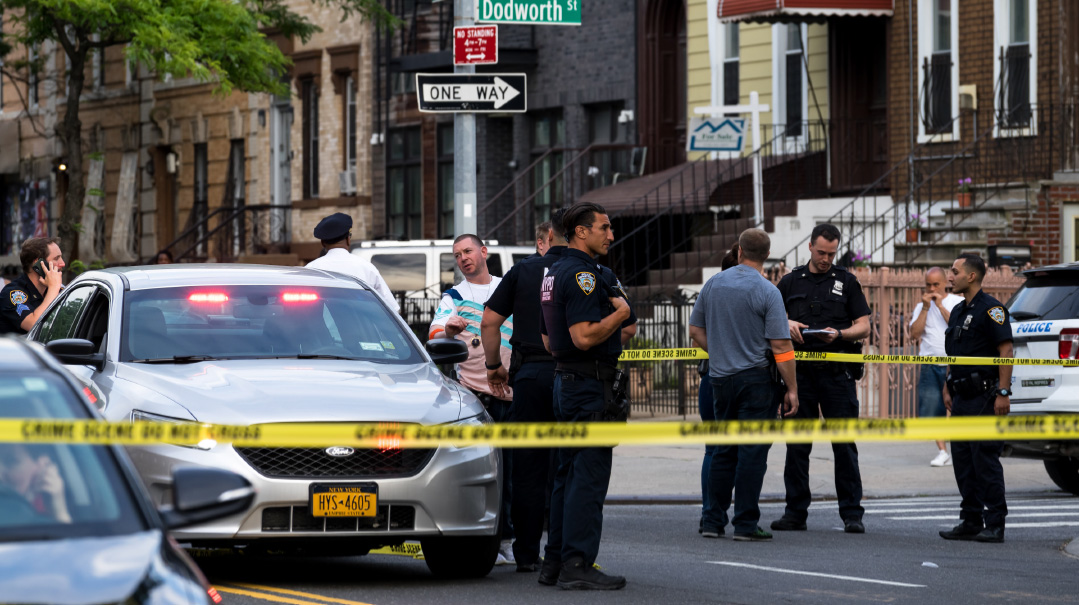
Under fire: Zeldin has pledged to “end the war on yeshivos”
Who Is Good for Yeshivos?
With New York’s 440 yeshivos threatened by draconian reforms, Hochul has spoken in their defense — but only in private conversations. The governor, who attended religious schools as a child, hasn’t said anything in public other than platitudes about the value of yeshivos after the state education department passed onerous regulations last month. According to a source who attended her meeting with Jewish leaders in Monsey two weeks ago, she promised she would defend yeshivos if the topic came up at the debate. It did not.
In truth, there is little a governor can do about the state education department. Ostensibly to keep education free of political maneuvering, the state constitution places the entire department under the independent Board of Regents, whose 17 members are appointed by the legislature. The governor can only exercise power by refusing to approve the department’s budget.
It is unlikely Hochul will use that medium to fight for yeshivos. She does not have the heft that Cuomo had, and she lost the one battle she waged against the state education department. This past spring, Hochul attempted to transfer child nutrition and school lunch services from the state DOE to the department of agriculture, which is controlled by her. Betty Rosa, the education commissioner, lobbied the legislature against the move and ultimately emerged victorious.
“This goes to show,” one Albany insider said, “that when people say that ‘Hochul controls the education department, and why doesn’t she say anything in defense of yeshivos?’ — she fought over a relatively minor issue and lost. So certainly, a Governor Zeldin wouldn’t have major influence.”
The insider added, though, that he could see a coalition of moderate Democrats, those in the mold of Simcha Eichenstein, working to push Zeldin’s agenda through Albany.
Whither the Jewish Vote?
Views about the race in the frum electorate are mixed.
“The frum community never had such a friend in Albany as Zeldin will be,” said Moshe Gold, an upstate yeshivah administrator. “Despite the Democratic majorities in the Assembly and Senate, I think that a strong governor who cares and shares our values will be a fighter for us. Governor Hochul has said she thinks very highly of the yeshivah system, but she hasn’t said it in public. Zeldin has come out very strongly and said that every family has the right to educate according to their values.”
Taking the contrary view, Sender Rapaport, the executive director of Masbia and a media whisperer for the community, says that states with Democratic governors have lower crime rates and better economies per capita than those led by Republicans.
“I give Zeldin credit for very avidly speaking out for the yeshivos,” Rapaport said. “If he wins, I hope he remembers everything he said, because it sounds very promising, almost beyond what’s possible to deliver. But Governor Hochul is doing a very good job. I believe she earned the vote of the Jewish community. I believe the governor is good for yeshivos, good for the economy, and good against crime.”
The friend who has alliances in Albany took a more nuanced view. He noted that the next governor will face a legislature that is strongly Democratic, possibly with a veto-proof majority. When it would come to changing bail laws or protecting yeshivos, he would have a bully pulpit at best.
“I would love to see Zeldin win,” he said, “although Hochul is not the monster she’s been made out to be.”
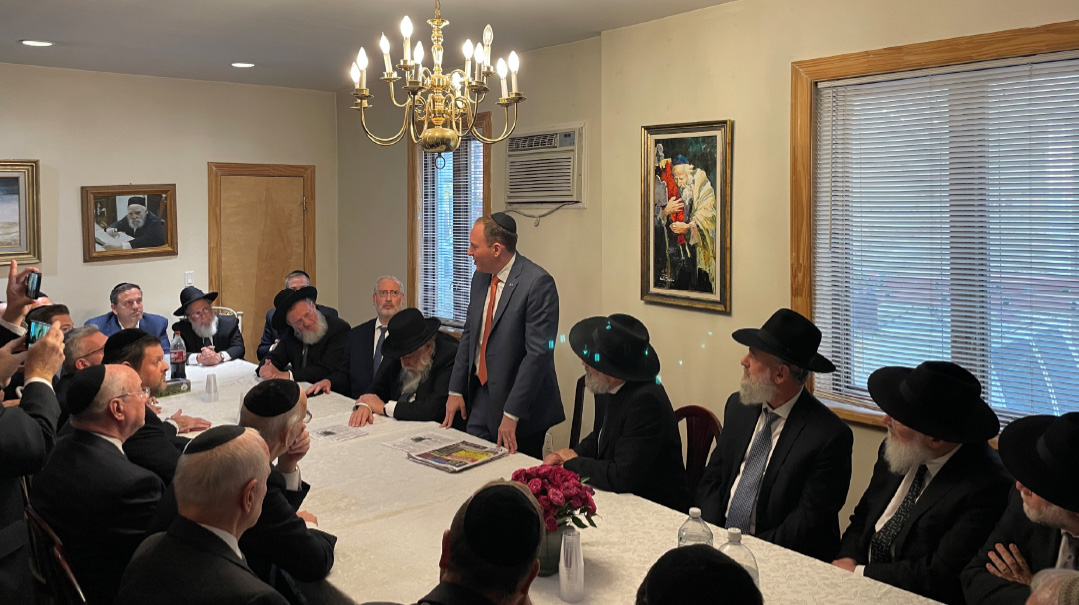
Photo: Chaim Krengel
A MAGA Governor?
No state has competed with New York more ferociously or bitterly than Florida. During the Covid pandemic, then-governor Andrew Cuomo and Florida’s Ron DeSantis traded barbs when one state’s infection rate rose or fell, each touting their own method of combating the virus — Cuomo through a strict lockdown policy and DeSantis by opening up and allowing people the right to decide how to live with Covid.
DeSantis was on Long Island this weekend, promising that a Zeldin administration would make New York more like the Sunshine State.
“I’d like to see him get in there and unleash your own energy here in the state of New York,” DeSantis told a cheering crowd. “So I think this is an important choice for the state of New York. Do you want to continue down the path that you’re on — the path that’s seen you hemorrhage people, wealth, you name it? Or you want to try a different direction?”
The appearance of DeSantis — widely presumed to be eyeing America’s top political job — underscored how the outcome of the race was increasingly becoming a national focus.
The Nation, the flagship progressive news site, whose editor in chief, Ross Barkan, was poached earlier this year from the unabashedly socialist Jacobin magazine, wondered how things unraveled so fast after Democrats seized a veto-proof majority in the legislature in 2018.
“Why isn’t Kathy Hochul running away with her race for reelection?” Barkan wondered in a piece for the site. He noted that Zeldin voted against certifying Joe Biden as the winner of the 2020 election, was an early Trump supporter, “and has never, at any point, recanted.”
Peggy Noonan, a former Ronald Reagan speechwriter, provided an answer in the Wall Street Journal, painting a dire picture of people “alarmed at the cost of things. They are afraid of crime. They don’t like what they see of the schools. You don’t want to be hit on the head on the way to the store... and you don’t want to be constantly doubting your kids are safe.”
In the face of all this, she added, “the Democrats don’t have a plan. This leaves voters thinking: We can’t turn it around with them.... With the Republicans, maybe their plans will work, maybe not, but at least they’re talking about what you’re thinking about, at least there’s a possibility they’ll come through.”
New York of 2022 is not the centrist Democratic state that once elected Republicans like Nelson Rockefeller and George Pataki. It has moved so far left that it has joined Oregon, California, and Vermont in the progressive zone.
If Zeldin wins, it would send a tremor through any Democrat who two years ago called to defund the police or thought that easing the fight on crime would be a winning issue.
Closing the Gap
Despite Republican gubernatorial candidate Lee Zeldin’s packed schedule in the campaign’s waning days, Mishpacha’s Omri Nahmias managed to catch up with him and get him to expound on some of the issues he’s been running on that are of prime importance to New York’s Jewish community.
Rising anti-Semitism and rising crime rates have become central issues to voters. What would you do as a governor to reassure the New York Jewish community?
We have to combat anti-Semitism on our streets, in our schools, and in the halls of government. On our streets, it is important that we end this catch-and-release policy that we see. There are other pro-criminal laws that have been passed that are very dangerous. We need to make sure that law-abiding New Yorkers are back in control of their streets again.
I will declare a crime emergency on my first day in office. I will suspend some pro-criminal laws and force the state legislature to come to the table to work with me on enacting long-term fixes. I believe that we need to provide more support to our men and women in law enforcement, and that district attorneys need to enforce the law. And right now there are district attorneys who have been getting elected and refusing to enforce the law, like we’ve seen with [Manhattan DA] Alvin Bragg. I’ve pledged that on my first day in office, the first thing I will do is notify Alvin Bragg that he’s being removed for his refusal to enforce the law.
It’s not just on the streets where we’re seeing the rise in anti-Semitism — we’re seeing it everywhere, even in the universities.
We need to stick up for Jewish students and Jewish faculty in higher ed institutions like the City University of New York, where the culture needs to be vastly improved, and where currently Jewish students and Jewish faculty feel like they are unwelcome and are being targeted. And I’m going to speak up on their behalf to identify, confront, and crush anti-Semitism in every form. It needs to be called out in the halls of government, and wherever it rears its ugly head inside of schools. And that includes on the streets.
Is it the governor’s role to address crime in New York? Or is it more the mayor’s role?
It’s everybody’s job to do absolutely everything in their power to combat crime. This isn’t about one elected official saying that they have no responsibility and it’s someone else’s job. This is about everybody understanding that it’s everyone’s job to do their part to make our streets safe again.
New York’s 440 yeshivos have been targeted for unprecedented sweeping and intrusive reforms by the state education department, which the Orthodox community regards as very dangerous. What do you do plan to do in office to address this issue?
I have vocally opposed the substantial equivalency push. My mother was once a fourth-grade yeshivah teacher in Brooklyn. This was something that my family has cared deeply about through the generations. And I’m going to do my part to advocate very strongly on behalf of yeshivah students and yeshivah parents and educators to tell the rest of the story and to end this war on yeshivos.
I believe that much of the positive story about yeshivah education hasn’t been told by people in government, including the current governor. And even if she was unwilling to speak out in favor of yeshivah education in opposing the substantial equivalency push, she could have at least said that there was another part of the story to be told that included how yeshivos teach right from wrong, the law-abiding lives that are lived by yeshivah students and graduates, the continuing education, the high attendance rate, and much more.
And when she was asked the morning of the vote to weigh in on this, she said that she’d rather not, because it was getting too hot. And she says it was outside of the purview of her office. The governor can have an opinion on anything, can weigh in publicly on that opinion, and can move public opinion with the governor’s position and reasoning. So her desire to stay silent while Albany was declaring war on yeshivos is totally the opposite approach from what I would have taken.
(Originally featured in Mishpacha, Issue 934)
Oops! We could not locate your form.






